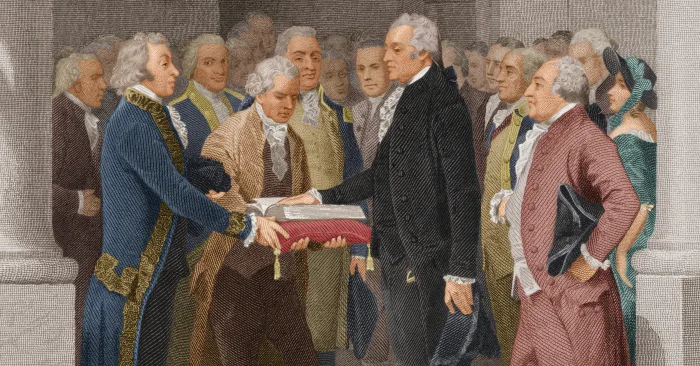Picture: the inauguration of George Washington as the first President of the United States. Stock Montage/Getty Images
 As the 2022 midterm elections approach, I have become aware of another issue causing voter suppression, which affects the United States most heavily. The issue is voter registration, an issue so basic that it had hitherto escaped my attention. However, Thom Hartmann mentioned how voter registration is more difficult in the United States than in other nations, on one of his recent shows. In addition to that, is the lack of a “voting holiday,” and scheduling elections on Tuesdays, when people may have to take time off from work simply in order to vote.
As the 2022 midterm elections approach, I have become aware of another issue causing voter suppression, which affects the United States most heavily. The issue is voter registration, an issue so basic that it had hitherto escaped my attention. However, Thom Hartmann mentioned how voter registration is more difficult in the United States than in other nations, on one of his recent shows. In addition to that, is the lack of a “voting holiday,” and scheduling elections on Tuesdays, when people may have to take time off from work simply in order to vote.
But getting back to the voter registration issue, according to government statistics, there are 51 million voters who could register to vote in the United States, but have not. Obviously, these numbers will change over time, but it remains clear that the number is on the order of 50 million potential voters, who have not even bothered to register to vote.
Is voter registration unique to the United States (as are so many things regarding politics)? No. In fact, most nations require voter registration prior to voting; however, the majority of these nations register voters automatically, saving potential voters the bother of registering to vote. Other nations do not require voters to register to vote at all before voting. Furthermore, most nations hold elections on weekends, or have election holidays in order to make it easier for citizens to vote.
Which demographics are least likely to register to vote? One answer to this question is obvious. The younger the citizen, the less likely that person is to be registered to vote. Each person has to make that initial step to actually register to vote. Eighteen-year-olds are not automatically registered to vote, and doing so may seem like a somewhat intimidating chore to many young citizens. Of course, this demographic tends to vote for liberal politicians, primarily Democrats, so this dynamic already favors Republicans. Regarding race, interestingly, only 17& of Blacks are not registered to vote, as compared to 20% of White citizens, according to Pew Research. However, a whopping 40% of eligible Hispanics are not registered to vote. Voting registration among Asians or other racial/ethnic groups was apparently not assessed in this study.
However, once again, the low registration rates among Hispanics, favors Republicans. Note: This study was done in 2006, so the data is somewhat dated, but probably still fairly close to current numbers.
I found an article on the History website, which discusses the history of voting registration in the United States, which is fairly illuminating on this topic (The Exclusionary History of Voter Registration Dates to 1800 – HISTORY). This article, by John Seven, discusses the expansion of voting rights over time, but also, how voter registration has been used to exclude certain demographics from voting, and how this continues to be a problem. Even as legal voting rights greatly expanded to previously excluded populations, it appears, the population which always had voting rights in the United States – landowning, White men, that is – used voting registration to the extent they were able to, in order to limit voting by other groups. Of course, the registration process was only the first hurdle in the voting process that these privileged gatekeepers foisted upon their fellow citizens, but it was a deleterious one to voting, especially by younger persons and people of disadvantaged groups.
According to Seven, voter registration systems were ostensibly set up in order to prevent fraud, but in practice, often ended up contributing to election fraud. During the post-Civil-War era, his was done primarily by avoiding registering poor (and presumably disproportionately Black) people. Later, there were voter registration laws in many states which were overly restrictive, such as only allowing people to register to vote on a few specific days of the year. Furthermore, when voter registries were developed, they were often confined to cities, making it more difficult for city dwellers to vote, than it was for rural residents.
If any of this history seems familiar, it should be. Republicans are using the same playbook, with perhaps slightly different plays, currently, in order to increase their leverage in elections. In fact, Harvard historian Alex Keysarr, who is quoted extensively in this article, explicitly mentions that current controversies regarding voter registration are similar to those in “southern states” in the 1890s.
What can we do about voter registration problems that result in decreased voter turnout?
As mentioned in the post, here are some possibilities, which are used in many other nations.
The best solution would be to automatically register every eligible citizen to vote when they reach the legal voting age, as is done in many nations. Short of that, we should allow same day voting registration. Make it as easy as possible for people to register to vote. Also, there should be more concerted campaigns to register voters, such as having citizens’ groups or government programs engage in widespread voter registration drives.
In addition, we should have a “voting holiday” on election days, or voting on weekends, as well as convenient options for voting by mail. Anything we can do to help increase voting rates, is important not only to having good election outcomes that correspond to the “will of the people,” but in fact, may be crucial to saving democracy itself.

